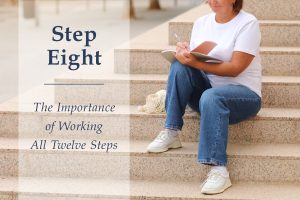The takeaway I would like believers to consider when sponsoring an atheist, agnostic, or freethinker is first to really examine what in the program works for you. Then, see if you can get outside of your comfort zone and do the translating for the newcomer instead of expecting the non-believer . . . to do it themselves.
I am athletic and an atheist. I don’t fit the stereotype of what a compulsive overeater looks like. Twenty-five years ago, before phone or online meetings took off and before anorexia and bulimia were in the media, I attended my first face-to-face OA meeting in Sacramento, California. California, land of the progressive, land of the open-minded, right? Wrong. I did not feel welcome. I did not go back.
I suffered the shame and torment of compulsive overeating for more than two decades before I found my first virtual OA meeting. As I continued attending, I’d ask if there were any atheists willing to speak with me about a higher power, and a disturbing pattern from believers emerged:
“Oh, have you read ‘We Agnostics’ in the Big Book?”
“There, there. Just ‘act as if,’ and God will bless you with abstinence.”
“I know Twelve Step programs say you can pick a God of your understanding, but if you really want this program to work, Jesus is the only way.”
And their actions said:
“Well, if you were at least agnostic, maybe there would be hope.”
“You’re going to start bingeing if you don’t believe in God.”
“I cannot comprehend how you have no belief in a supernatural anything, divine guidance, a higher anything, so this program won’t work for you.”
I came very close to quitting Overeaters Anonymous. I could not find anyone who understood that when I am in the depths of my addiction, when I’m in my hole and still digging, the last thing I need to do is translate references to “God” into something that makes sense to me!
I have written a godless, spirituality-less twelve steps and am working these steps with a lovely atheist right now. We are so connected through our core values that I think we were separated at birth. I’ve met many other atheists who are kind and compassionate and who have said just the right things at the right moments. Would it be nice to have that warm, fuzzy feeling that something greater than ourselves has brought us together? Not to us. Atheists don’t cherry-pick the wins and ignore the losses. The thing is, the number of times we’ve just missed meeting the person of our dreams or passed on a life-altering opportunity is astronomical.
I came to OA in desperate need of a way to stop this life-threatening behavior. Now, I have a power greater than myself: a community that understands exactly how I suffer, gives me permission to fail, and keeps supporting my recovery when I do fail. This is the value of the program—not a higher power, not a lower power. In OA, we define our abstinence and our higher power or choose not to have a higher power at all. I and all those who find meaningful lives and freedom from compulsive food behaviors define these terms so we can succeed. To have success in OA, it is possible to be a believer and an atheist. It is the community’s support for me as well as my contributions to others’ successes that is the key. The happy byproduct is one’s own success and freedom from compulsive food behaviors.
The takeaway I would like believers to consider when sponsoring an atheist, agnostic, or freethinker is first to really examine what in the program works for you. Then, see if you can get outside of your comfort zone and do the translating for the newcomer instead of expecting the non-believer, who is in a terrifying and life-threatening situation, to do it themselves. Perhaps, in time, they will be able to do the translating, but do we really want to lose them before they get a foothold? Refer them to an atheist/agnostic/secular specific-focus meeting. Please consider that my story is definitely not unique.
—Teresa
For Discussion and Journaling
In this story, the writer suggests that theistic OA sponsors translate OA’s “God language” into terms that the still-suffering atheist, agnostic, or freethinking newcomer can relate to, to welcome the newcomer, ease their adoption of our program, and help them find solid footing. What are some ways you can follow through with this suggestion? You may need to seek out atheist or agnostic members to learn from their experience, strength, and hope.





